9/11 in their own words: 'Dust Lady' Marcy Borders, fire fighter Mike Kehoe and survivors recount the tragedy that claimed 2,753 lives
Ms Borders died of cancer earlier this week
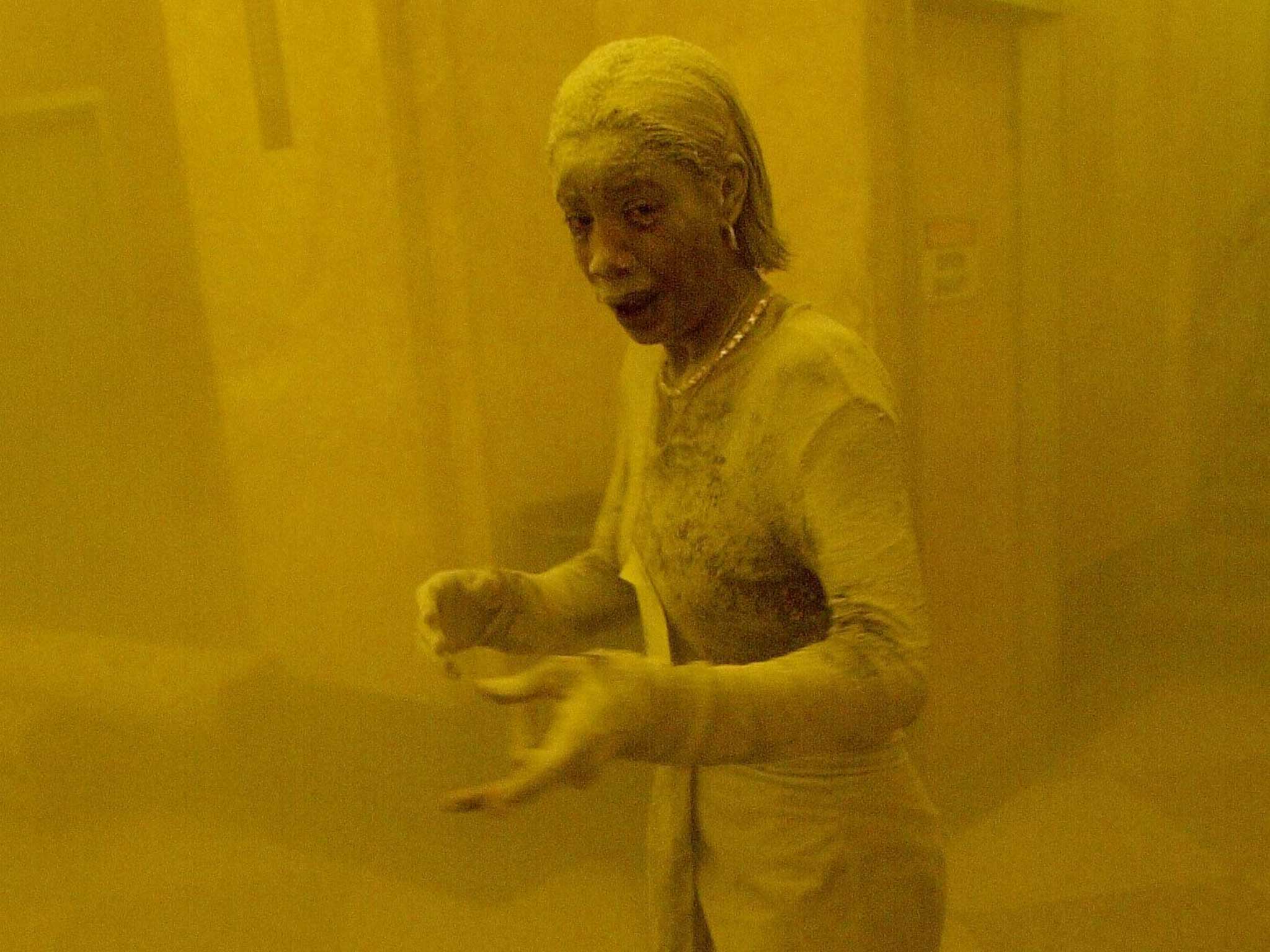
Your support helps us to tell the story
From reproductive rights to climate change to Big Tech, The Independent is on the ground when the story is developing. Whether it's investigating the financials of Elon Musk's pro-Trump PAC or producing our latest documentary, 'The A Word', which shines a light on the American women fighting for reproductive rights, we know how important it is to parse out the facts from the messaging.
At such a critical moment in US history, we need reporters on the ground. Your donation allows us to keep sending journalists to speak to both sides of the story.
The Independent is trusted by Americans across the entire political spectrum. And unlike many other quality news outlets, we choose not to lock Americans out of our reporting and analysis with paywalls. We believe quality journalism should be available to everyone, paid for by those who can afford it.
Your support makes all the difference.The bank worker photographed dramatically fleeing the burning Twin Towers in 2001, whose image became one of the defining photographs of the tragedy that claimed 2,753 lives, has died.
Marcy Borders died on Monday evening, aged 42, after succombing to stomach cancer - an illness she maintained was caused by inhaling dust particles on 9/11 after she fled her office on the 81st floor of the World Trade Centre.
Speaking only three years after the catastrophe, one which sent America to war and prompted a decade of national soul-searching, the 'Dust Lady' - then 30 - spoke to The Independent about her fight to regain normality in the wake of the attack.
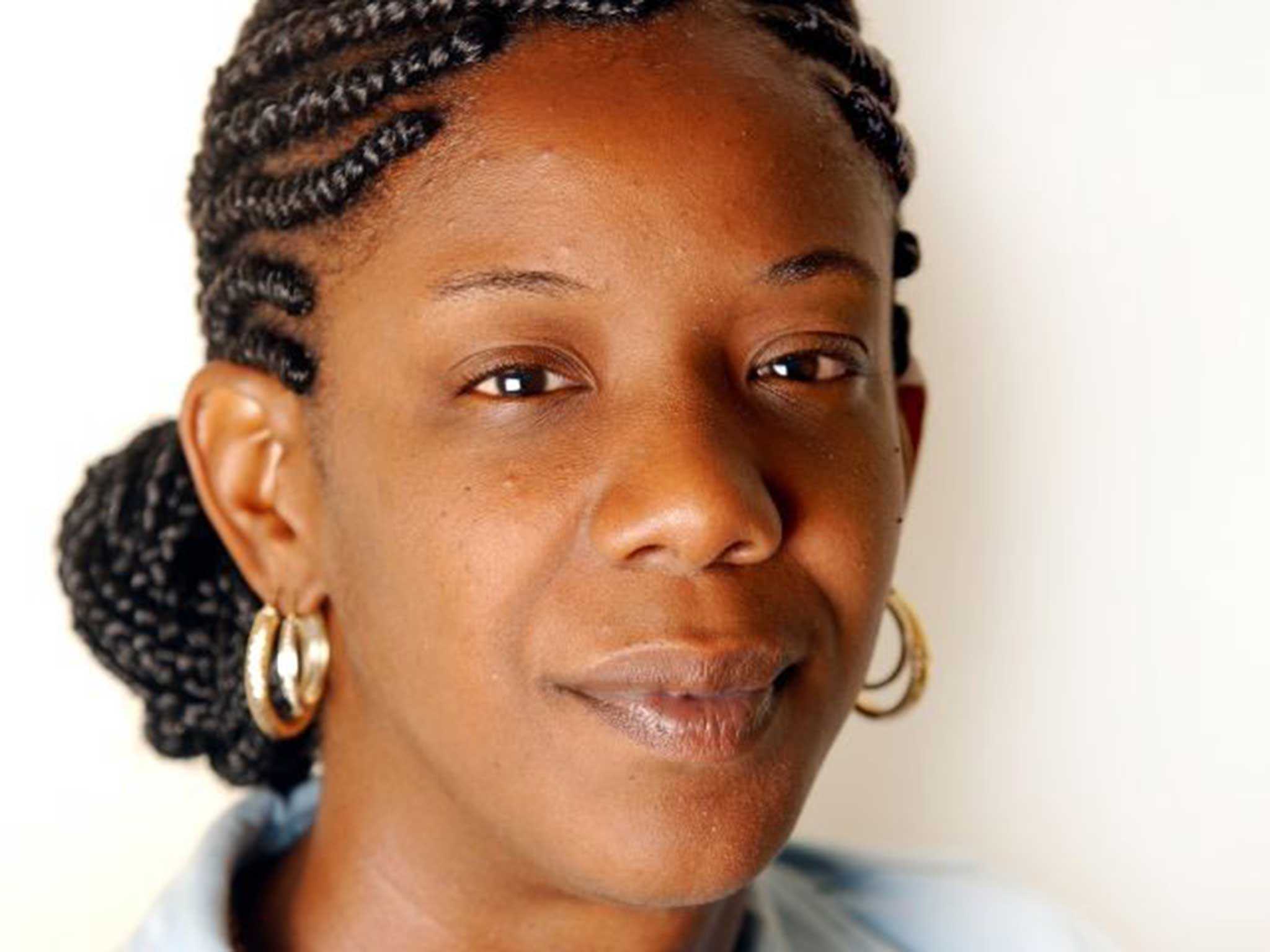
Marcy Borders
"My daughter went to live with her father while I tried to get over the nightmares and the panic attacks. But now I have a new apartment and she has moved back in.
"I had only been working at Bank of America for four weeks when we were attacked. I was standing at a photocopier on the 81st floor when the plane hit. My supervisor was telling everyone to calm down and stay at their desks. But I just ran. I don't know if that supervisor got out alive or not. But I doubt it.
"I just ran into the street and then the towers collapsed. I thought we had been bombed. I couldn't see anything because of the dust and I was running blind. I smashed my head on a scaffolding pole and I still have the scar.
"My world was turned upside-down by September 11. I lost everything - my self-esteem, my faith, my job, my daughter. I didn't think I would ever get over it. I tried to go back to work, but every time a door slammed I would scream. Now I have my daughter back I have found the strength to go back to church and to look for work."
Speaking to The Jersey Journal in November 2014, Ms Borders questioned whether her cancer was related to 9/11: "I'm saying to myself 'Did this thing ignite cancer cells in me?'" she said. "I definitely believe it because I haven't had any illnesses. I don't have high blood pressure...high cholesterol, diabetes.
"How do you go from being healthy to waking up the next day with cancer?"
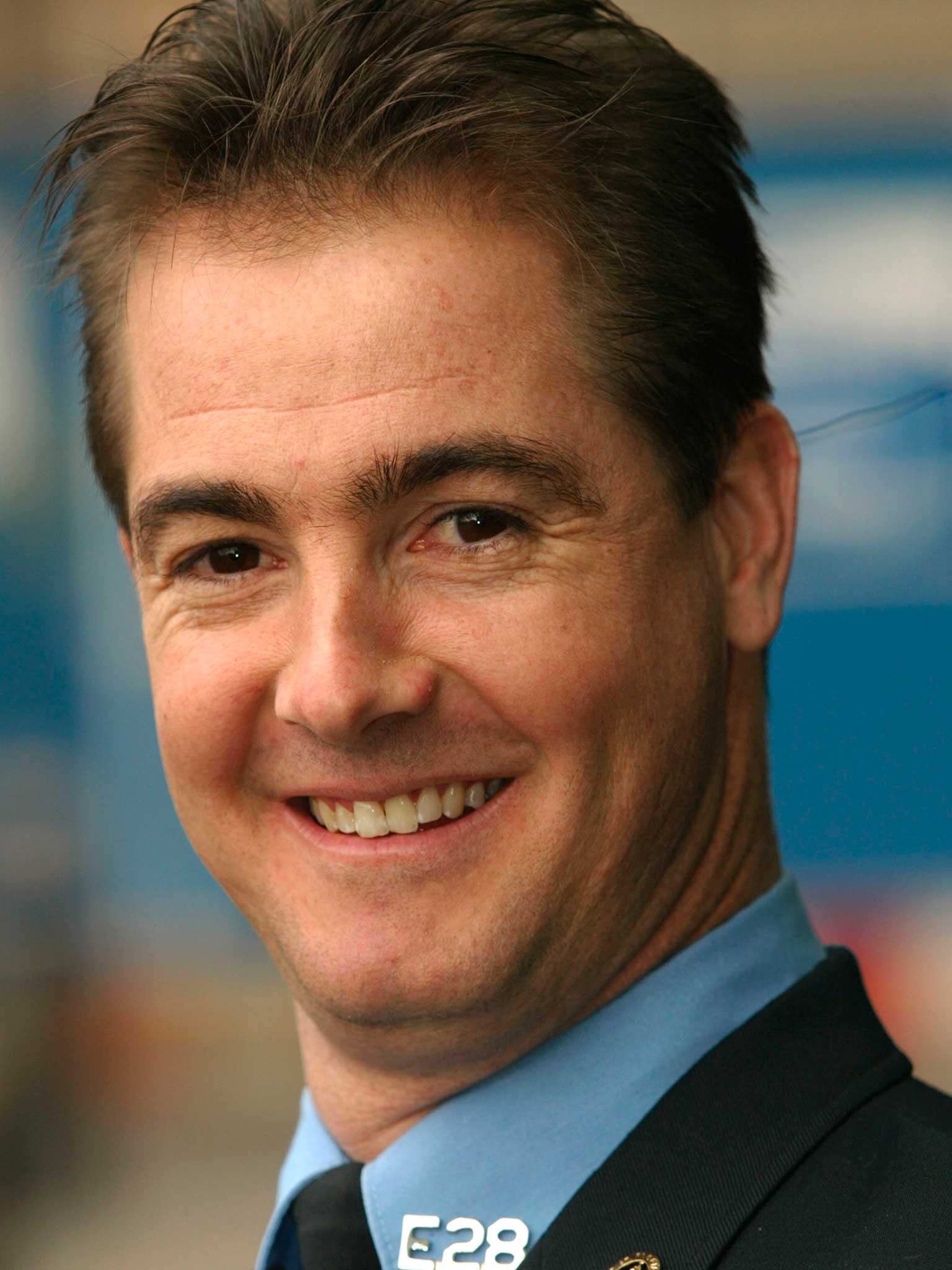
Mike Kehoe
The New York firefighter, 36, was photographed racing up the stairs minutes before the first tower fell. For two days, newspapers reported he had been running to his death. When they found he was alive, he became a reluctant symbol of the bravery shown by rescuers.
"I've had enough of being the hero and I just don't want to talk about it any more.
"I went over to England for the Pride of Britain awards and everyone was treating me like a hero, like I had saved hundreds of people. But I only saved one person that day, and it was me. I saved my own life because I ran. We were all so terrified.
"You get used to burning buildings because you see them all the time, but this was something none of us could have ever imagined.
"I find it hard even now when people call me a hero. I am not a hero, I was just doing my job like everybody else.
"I was up on the 28th floor of the first tower when the second plane struck.You could feel it even though it was the other tower. It seemed like King Kong had grabbed hold of the towers, and started shaking them. Our chief shouted over the radio: 'Everybody evacuate, everybody evacuate the building now,' and we all turned and ran.
"It must have taken me less than three minutes to get all the way down to the lobby, and it looked like we were in Beirut. There was rubble everywhere, and people screaming. I ran out into the street and it collapsed behind me.
"I'm not doing any more interviews."
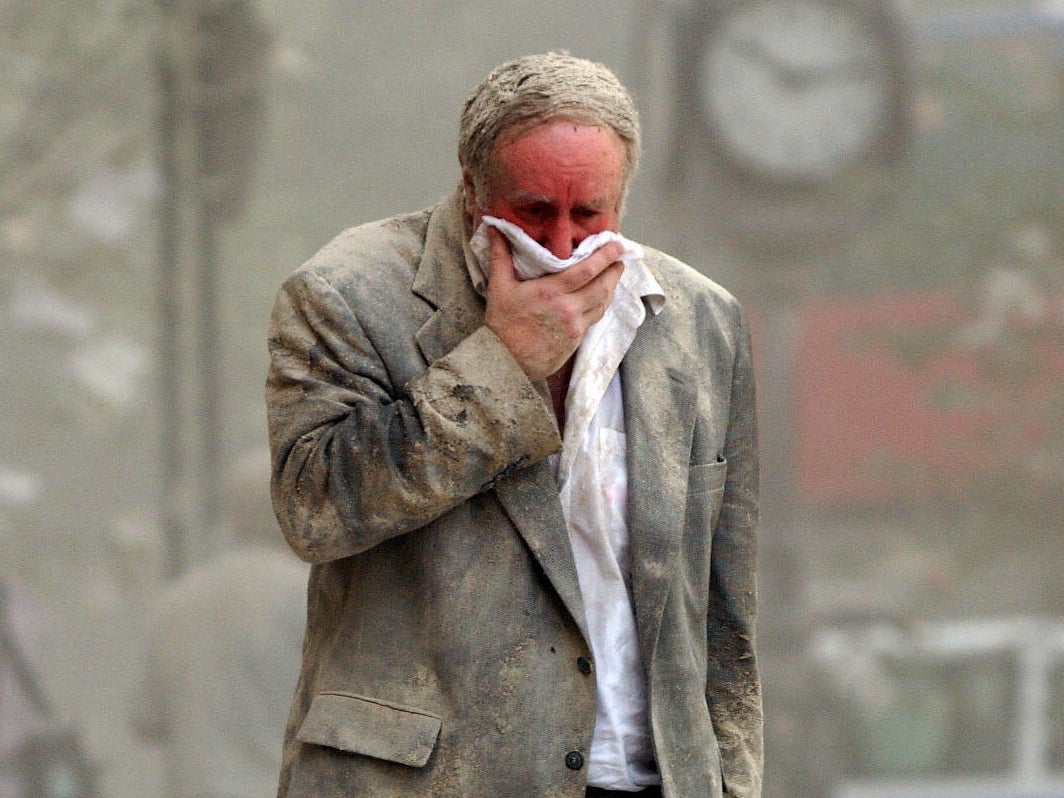
Ed Fine
The photograph of a New Jersey businessman, Ed Fine, stumbling through debris with a handkerchief to his face captured the horror and disbelief of workers caught in a war zone. Minutes before it was taken, the father of two had prepared himself to die as he was buried by ash from the crumbling north tower.
"I have seen a few anniversaries now, and I have attended some ceremonies, but I am trying to put it behind me, so this year I am going to Australia on business for the week.
"I was at the World Trade Centre on 11 September for a one-off business meeting because my son Steve, who is also my business partner, had phoned in sick and he asked me to cover it. I only survived because I missed the elevator. If I had been there two minutes earlier, I would not be here today.
"I'm a little older, and a little more experienced in the ways of the world, so considering the fact that I only just got out alive, who knows what would have happened had my son been there in my place.
"I walked down 74 floors and got outside just as the first tower fell. I curled up in a ball expecting to die, and I remember thinking how ironic it was that God had saved me from the building and now I was going to die in the street. I must have lain there for a couple of minutes, then I got up and started walking. It was then that the photograph was taken.
"I have a copy of the photograph at home and I sometimes get it out when people ask, but I don't look at it often. Each time I see the picture I can't believe I was there, and I can't believe I got out alive. I still wear that suit to important meetings - it's my lucky suit.
"It strengthened my faith in God. I feel I was saved for a reason, and I have tried to integrate that into my business practices. Where I used to work to make money, now I try to work for the good of the people around me."
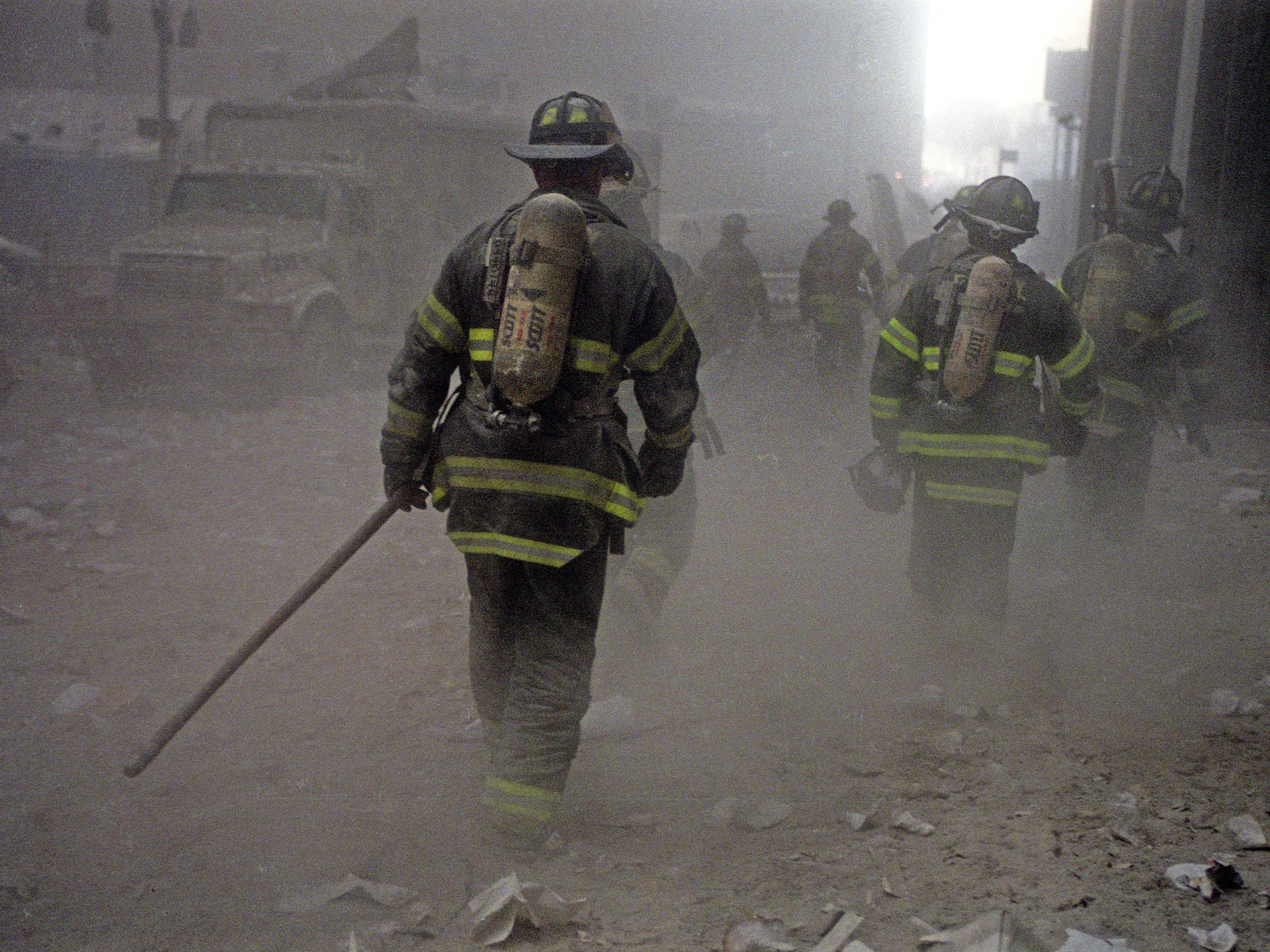
Jerry Reilly
Firefighter Jerry Reilly, 53, is perhaps the most famous face from 9/11. The care-worn image, deep in thought and covered in dust, became the symbol for fundraising efforts across the US. It was on billboards from Los Angeles to New York, with the headline: "When other's rushed out, he rushed in."
After 9/11, he worked in an office for a year before retiring. Now lives with his wife in upstate New York, and spends his time running a charity for victims' families.
"At first, the picture was embarrassing. I didn't know the photo had been taken. It was my face, but it represented so many other people. I gave my permission for them to use it as a fund-raiser, and then it was suddenly everywhere.
"On the morning of 9/11, we knew it was different from any other fire. When we got there all the jumpers were coming down. It's the jumpers that stick in my mind more than anything. I probably saw about 40 people jump and when I was in the building you could hear them landing.
"I had my five guys with me and we were supposed to go up to the 75th floor on the north tower. We were in there for about three minutes looking for a working elevator when the south tower came down. We heard the noise and I yelled: 'Get against the wall!' We did not know the building had come down. It went pitch black, the whole building shook. I thought it was a bomb. I thought I was dead. It was completely black. We were covered in a lot of debris. My mask was full of it, but I could feel a draft and I went to that and got out on to West Street shortly before the second tower fell. I was sitting down trying to take it all in when my picture was taken, and I honestly can't remember what I was thinking at the time.
"Personally, my family and friends and the rest of the firemen have helped me get through it. Everybody in New York lost someone they know. I guess I knew about 50 people that died."
Rachel Uchitel
Rachel Uchitel's face as she handed photos of her fiancé to strangers outside Bellevue Hospital came to symbolise the pain of thousands searching for the missing in the days after 11 September. She had been engaged to a 32-year-old bond trader, James Andrew O'Grady, for a month when he was killed. She has slowly rebuilt her life.
"For years I thought I would never be happy again, then last November I met a childhood friend I hadn't seen in years at a Hallowe'en party and I began to live again. Steven was just perfect - he wasn't scared to ask about Andy. We became instant friends and everything fell into place from there.
"He swept me off my feet, and in May he proposed. We are getting married in November, and the best thing about it is that Steven is OK that Andy will still be a big part of both our lives.
"A month after Steven proposed I quit my job because I didn't need work to keep me going any more, and I wanted to concentrate on planning my wedding. I'll get a job after we are married, but because Andy and I didn't have much time together, it makes me want to enjoy the time I have with Steven all the more.
"I'm not sure what I'll do on the anniversary this year. I won't be going down to the big Ground Zero ceremony, it's too crowded and everyone is so sad. I'll probably spend the day quietly, maybe with my mum."
Many firefighters found it hard to bounce back after September 11th Armando Reno
The firefighter, who is aged 58, was buried alive when the World Trade Centre collapsed. The father-of-three radioed for help from the rubble. He is now retired because of back injuries he sustained on the day.
"They pensioned me off as disabled because of my back. It is very badly damaged. I still have two vertebrae that refuse to heal, and I am on a cocktail of painkillers.
"My wife works for the Department of Motor Vehicles, and I dedicate my time to my new Corvette sports car and meeting the lads at the firehouse. I really miss my old job; every time I go down to the firehouse and the bell goes off I get an adrenaline rush.
"I remember the day as clear as a bell. After the first collision, debris was flying everywhere. We were dodging stones and bodies and then I was hit on my back by a piece of debris that sent me flying 40 feet in the air and knocked me unconscious. I didn't even hear the towers collapse. I was unconscious on the ground. When I woke up I realised I was buried alive, but I managed to radio for help and told them I was next to a fire truck, which I could see out of the corner of my eye. It was really damaged and battered, but I didn't know why. I had no idea at that time what had happened.
"The first few months were very difficult. I was in terrible pain and kept passing out through exhaustion. I'd be in the middle of a conversation then I'd doze off in front of people. This year, I'll maybe go to a ceremony or two, and say a prayer for my lost brothers, but I'm not going to get all worked up and emotional. That would be letting the terrorists get to me. A lot of my friends didn't make it back from the rubble. I can't tell you how upsetting that's been. It makes you feel so lucky to be alive."
A previous version of this article was first published in April 2003
Join our commenting forum
Join thought-provoking conversations, follow other Independent readers and see their replies
Comments